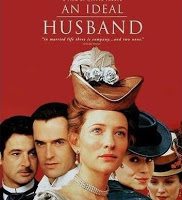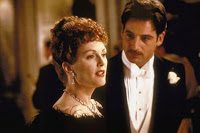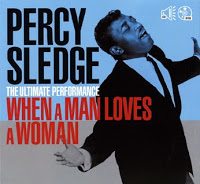Ideal Love is Blind

Ideally, a husband should be honest, faithful, brave, and a good provider. A dog can deliver all but the last. Still, we keep hoping to find all these qualities in the perfect man. What if we do? And marry him? And then discover he’s not perfect after all?
This is the interesting question posed by Oscar Wilde in the play An Ideal Husband. It being Wilde, there’s plenty of witty banter and there are some moments of farce, too. But the tone is more serious than his best-known play, The Importance of Being Earnest. Underneath the bon mots and the flirtations is the issue of moral probity in public and private life.

The ideal husband of Oscar Wilde’s play is a rising young politician whom all think is the very model of an honest man. I noticed something after seeing this story twice in rapid succession, first the movie version with Rupert Everett and Julianne Moore (with fantastic hair), and then the live play by the Shakespeare Theatre Company. The woman who is married to the ideal husband has no sense of humor. Her husband must be perfect. When a rather large flaw is revealed from his past, she is outraged and condemning. Her husband is equally humorless. As a politician he takes himself and his public role very seriously. Brits view their politicians as pompous, and the ideal husband in Wilde’s play certainly is on the edge of it. He emanates conviction that he’s doing important work and moreover that he is fit for it.  This kind of self-regard, despite his own secret dishonest action in the past, seems common to politicians. In America we view such feet of clay with outrage, just as humorlessly as his wife does, in fact. We make no allowances for people to be human, to have flaws. The man on the pedestal must be knocked off it into the dirt. Wilde teaches his self-righteous couple that there is a middle way, one that includes forgiveness and acceptance of the flaws of a loved one.
This kind of self-regard, despite his own secret dishonest action in the past, seems common to politicians. In America we view such feet of clay with outrage, just as humorlessly as his wife does, in fact. We make no allowances for people to be human, to have flaws. The man on the pedestal must be knocked off it into the dirt. Wilde teaches his self-righteous couple that there is a middle way, one that includes forgiveness and acceptance of the flaws of a loved one.

Widen this idea (or narrow it, if you prefer) to the romantic search for the perfect man, the man we want to marry. Does he exist? Only if we put on blinders and pretend that our beloved has no flaws and has committed no sins. And never will, either. The Percy Sledge classic song, “When a Man Loves a Woman” contains the line “If she’s bad he can’t see it.” We talk about being “blindly in love.” What happens when we see the real person?
